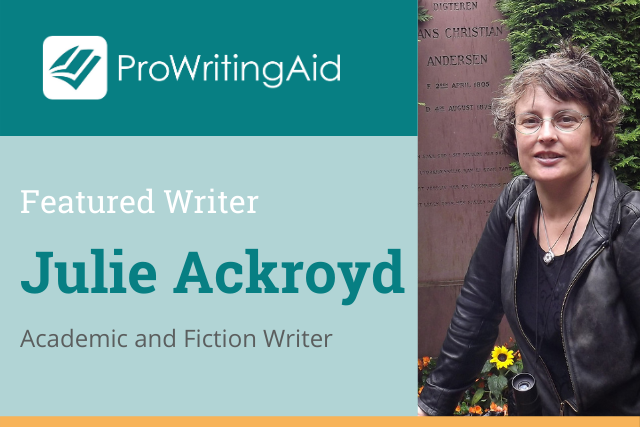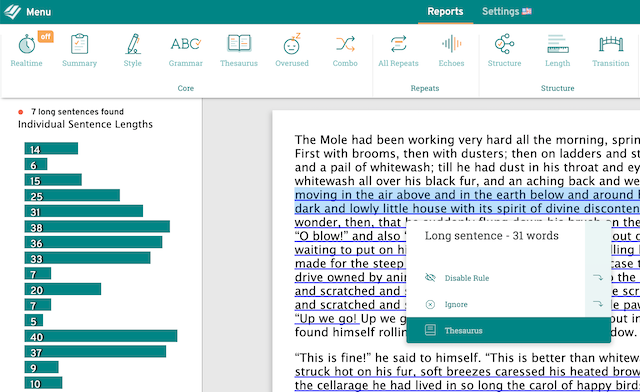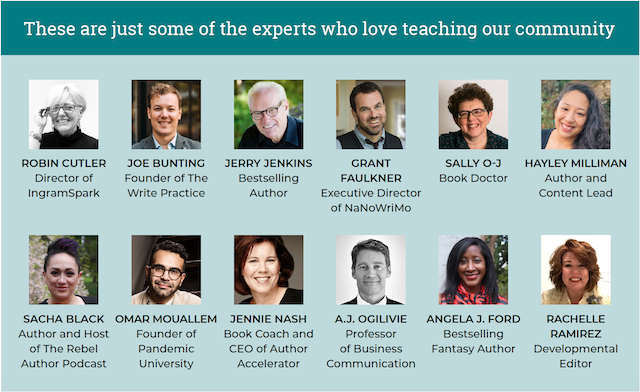
There are all kinds of writers in the ProWritingAid community, all with very different writing styles. In this new series of blog posts, we’ll be featuring two ProWritingAid users each month to learn more about their writing processes and how ProWritingAid has helped them on their writing journey.
Our first featured writer is academic turned fiction author Julie Ackroyd. She shares how ProWritingAid has helped her to avoid the drudgery of endless re-reads so that she can enjoy the editing process.
Keep reading to find out more about Julie’s process, and for details of how you could become our next featured writer.
What do you write?
My current project is a fictional series entitled Mermaid Dreams. The first book, Puffin Therapy, has just been awarded an Honourable Mention in A Women’s Write Unpublished Novel Competition for 2020. The series charts the adventures of the crew of a little ship called Mermaid as they travel around the western isles of Scotland.
I have published non-fiction work before: Child Actors on the London Stage Circa 1600 came out in 2017, through Sussex Academic Press. It was shortlisted for the Society for Theatre Research Book Awards.
Where do you find inspiration?
For my current fiction project, I gain inspiration from the places I work. For the last three years I’ve been based in the wilds, walking and sailing through some amazing scenery. In the south of England, I patrol the North Kent Marshes talking to people about bird conservation. In the north, I am a wildlife guide on sailing trips around the Hebrides, off the west coast of Scotland. I’ve been lucky enough to travel to the remote island of St Kilda, swim off the deserted island of Taransay, hike up An Sgurr on the isle of Eigg, and spend evenings on anchor in Tobermory Bay on Mull.

It’s great to get up, go to work and have encounters with whales, eagles, dolphins, and deer. These experiences of moving through a landscape which you are writing about gives your writing texture. I hope that my readers will feel that they are there with the characters. Get the setting right and the characters you invent have a believable and interesting place for their lives to unfold within. Armchair travelling, when the real thing isn’t available, is the next best thing.
Tell us about your writing and editing process.
Dealing with a notebook in the middle of a marsh or a ship’s deck on a research trip can be a bit tricky. Although it is inspirational, wind and weather can make writing on paper impractical...
Until now, I’ve always worked on factual writing projects. I’ve produced commercial magazine articles, historical non-fiction books, academic journal articles, and online articles. They all have to fulfil a specific brief. There are certain facts you must bring in, they have tight word limits, and there’s a lot of referencing needed. In contrast, writing fiction means I can have fun…
I enjoy putting the characters in a tricky situation and then seeing what happens. There were two initial questions running around my head when writing Puffin Therapy: What happens if you never want to go home from your holiday? How can someone stuck in a rut reinvent themselves successfully in an unfamiliar environment?
For my fictional project I’ve written outside a lot of the time. Dealing with a notebook in the middle of a marsh or a ship’s deck on a research trip can be a bit tricky. Although it is inspirational, wind and weather can make writing on paper impractical... I now write most of the basic scene construction and dialogue using Word on my phone. I’ll get it down in a document, then email it to myself.
Back from my trip, I work on the laptop and incorporate that scene into the wider book structure. I keep three files for each book I’m writing: Part A, Part B, and Part C. This encourages me to remember to use a three-act structure to push things along. I can’t remember who said it but: ‘Act one you put your character up a tree, act two you throw stones at them, act three you get them down gracefully.’ Three acts means that the plot is pacey and there’s never a dull moment.
I hope that readers will enjoy following the ups and downs of life for my main character, Sally. She’s going on the trip of a lifetime, exploring the western isles of Scotland, and finding out a lot about herself whilst she there. She also has a close encounter with puffins—and what’s not to like about puffins!
What do you love about writing and editing?
The most fulfilling point in the writing and editing process has been getting a reaction from my brilliant beta readers. I can’t stress how important this step is, even if going public for the first time is nerve-wracking. My star reader, who is really insightful, made my day when she first sat down to read it. She picked it up for ten minutes before turning in for the night. Several hours later (at 1.38am) she emailed to say she had reached page 64. She couldn’t put it down, but really had to go to sleep now. It definitely held her attention.

Beta readers can also help when you are worrying about how a plot point may be received. I was anxious that a particular scene, where Sally confronts a few demons from her past, may come over as trite. I needn’t have worried. Two readers reported that the episode made them cry, which was the reaction I was hoping for. Likewise, when I asked the readers what they found funny, notes came back saying there were too many points to mention… so I guess we’re doing OK on that.
Good beta readers can also help you edit out any inconsistencies in the characters. If they come back to you saying, "I’m not sure why this character did that" or "Are A and B going to get together?" then you need to make sure that you clearly telegraph what your intentions are. We did have long email discussions at one point as a particular character created a straight down the middle split. Half the group hated him because he was rude. The other half loved him for it. They found his behavior awful but entertaining. A reaction is a reaction, so he stayed... despite the fact that one reader said he deserved to be dropped off the end of the ship and drowned! (His name is Beastie, by the way, so when we are in print tell me what you think about him.) At the moment, in Book 2, he’s in Accident and Emergency with a wastepaper bin stuck on his head.
What do you find difficult about writing and editing?
...a friend sent me a link to ProWritingAid and I’ve not looked back. I’m enjoying editing now.
I find it difficult to stop writing. This project was originally a single book with a strong female protagonist, who literally goes on a voyage of discovery. However, the surrounding characters have developed lives of their own. Each has different motivations, needs, wants. There are so many stories to tell. Each character’s actions have a knock-on effect on the lives and loves of those around them. So much so, that we are now looking at a series based around the crew of the ship.
My non-fiction book took three months to edit. I swore, after that experience, I would never write anything again. I found it hard. My partner agreed that editing was tough. He was thoroughly fed up of reading the same chapter over and over, to pick up the points which I had missed. Then a friend sent me a link to ProWritingAid and I’ve not looked back.
I’m enjoying editing now. The drudgery of reading through and finding the errors is done automatically. You get a marked-up manuscript and a report. This information can be quickly accepted or ignored, which enables you to edit and then move on to the more interesting work of enhancing feelings and images in the language. This has worked so well that in my Honourable Mention for the novel competition, the judge’s feedback highlighted how professional the editing was. That’s a big confidence boost. Nothing jarred in the text to take away from the story.
Which is your favorite ProWritingAid report? Why?
I love the sentence length report. I get so carried away putting ideas on the page that the structure initially goes out of the window. The sentence length report helps me break up those ideas and ensure that the meaning isn’t lost.

I initially signed up for ProWritingAid because a friend sent me the link and said that it was useful. I assumed that it was a piece of software which might take some of the stress out of editing. However, it has been much, much more than that. The number of free webinars on offer astounded me. The editing webinars with Sally O-J have been really helpful, as have the Write-Ins run by Hayley Milliman. It’s a proper little community and there’s some great skill-sharing going on. For one session, I was selected as a guinea pig to have my book logline worked on. That really helped when approaching agents.
More About Julie
At present the manuscript for Puffin Therapy, the first instalment of the Mermaid Dreams series, is being circulated around agents. If you are interested in providing representation do get in touch.
You can find Julie on LinkedIn, and follow her winter work and summer travels on Facebook.
We’re so grateful to Julie for taking the time to share her writing process with us and allowing us to escape to the Scottish Isles (if only in our minds!). We can’t wait to read Julie’s novel Puffin Therapy once it’s in print, and wish her the best of luck on her publishing journey.
Could You Be Our Next Featured Writer?
Is ProWritingAid part of your writing process? We’d love to hear from you! Fill out our featured writers form, and you could be our next featured writer!

